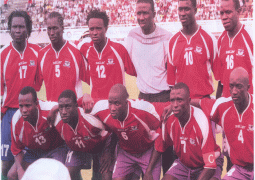The Lower River Regional population and housing census team has notified the traditional leaders in the region with the ongoing proceedings of the much-awaited exercise of the 2013 Census, to be conducted by the Gambia Bureau of Statistics (GBOS), commencing April 8.
“We have gone far now in educating these local leaders, including the governor and the chiefs on the duties of our census officials and the responsibilities of respondents within the region,” Lamin Kanteh, Lower River Regional Census Officer, told The Point Newspaper in Mansakonko on Saturday.
The Gambia Bureau of Statistic stated in its operational manual that compound owners and heads of institutions are expected to unlock their gates for the enumerators in different phases, as well as respond to the demand of several questionnaires in separate folds.
Enumerators have been assigned with their supervisors to begin the census with listing of all compounds, households, institutions and location of outdoor sleepers from the 8th to 14th April before the actual data collection on household particulars for each of the listed locations.
GBOS relies on the Statistics Act of 2005, which empowers the Statistician General to conduct direct population census with provision to appoint census officers for the completion of census forms and the protection of confidentiality.
Details on the census programme brochure showed that the exercise is expected to survey on a wide range of issues, including education, health and agriculture in a series of folds within a period of twenty-one days.
After his sensitisation rounds with heads of the regional authorities, Lamin Kanteh, described the ongoing training of census officials as a crucial pillar towards the accomplishment of the 2013 Census demand.
According to him, the training session was designed in such a way that testimonies through challenges during the last census would be reviewed to guide the success of this year’s census for 203 enumerators and 45 supervisors for the Lower River Region.
He confirmed reports on instances where certain compound owners inflate the size of their families with the hope that the data collection work is meant to bring them payments or gifts, based on the magnitude of their households.
In other situations, he said, there are cases where respondents are so reluctant to give information in response to the census questionnaires due to reasons best known to them.
On the importance of the population and housing census, Mr. Kanteh said all decision-makings and developmental activities of the country rely a lot on the data they hope to generate from the 2013 Census for the next ten years.
“The main objectives of conducting a population and housing census is to enumerate all persons and building in all parts of the country in order to provide the government, municipalities/area councils, business, private organisations, individuals and other stakeholders with the number of persons in each district, region/ municipality, ward, town or village according to sex, age and other socio-economic characteristics.
The size, age, sex and distribution of the population of the country, coupled with the use of Geographic Information System (GIS) technology would help policy-makers decide on the distribution of facilities and also locate new facilities across the country,” he said.
Read Other Articles In Article (Archive)
Great Alliance FC won late Pa Sulayman Fadera tournament
Jan 29, 2010, 11:23 AM



